
The Heliantheae are the third-largest tribe in the sunflower family (Asteraceae). With some 190 genera and nearly 2500 recognized species, only the tribes Senecioneae and Astereae are larger. The name is derived from the genus Helianthus, which is Greek for sun flower. Most genera and species are found in North America and South America. A few genera are pantropical.

The Gnaphalieae are a tribe of flowering plants in the family Asteraceae. It is most closely related to the tribes Anthemideae, Astereae, and Calenduleae.
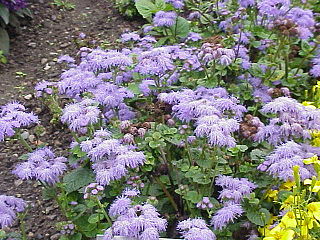
Eupatorieae is a tribe of over 2000 species of plants in the family Asteraceae. Most of the species are native to tropical, subtropical, and warm temperate areas of the Americas, but some are found elsewhere. Well-known members are Stevia rebaudiana, a number of medicinal plants (Eupatorium), and a variety of late summer to autumn blooming garden flowers, including Ageratum (flossflower), Conoclinium (mistflower), and Liatris.

Psathyrotes is a genus of North American plants in the sneezeweed tribe within the sunflower family. It contains annual and perennial forbs and low subshrubs native to dry areas of southwestern North America. Common names include turtleback, brittlestem, and fanleaf.

Tageteae is a tribe of the plant family Asteraceae. It consists of approximately 260 species divided among 32 genera. All are found in the New World, with a center of diversity in the Mexican highlands. The type genus is Tagetes (marigolds).
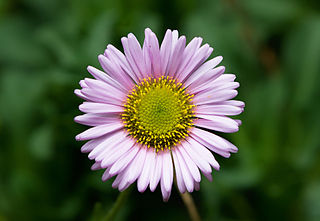
Astereae is a tribe of plants in the family Asteraceae that includes annuals, biennials, perennials, subshrubs, shrubs, and trees. They are found primarily in temperate regions of the world. Plants within the tribe are present nearly worldwide divided into over 250 genera and more than 3,100 species, making it the second-largest tribe in the family behind Senecioneae.

Thymophylla is a genus of perennial flowering plants in the tribe Tageteae within the family Asteraceae. Pricklyleaf is a common name for plants in this genus.

Perityle is a genus of flowering plants in the daisy family. They are known generally as rock daisies.

Psilostrophe, the paperflowers is a genus of North American plants in the sneezeweed tribe within the sunflower family.

Dyssodia is a small genus of flowering plants in the family Asteraceae. Many species formerly included in Dyssodia are now treated as members of other related genera, including Thymophylla or Adenophyllum. Dyssodia papposa is usually retained in this genus. The name is derived from the Greek δυσοδια (dusodia), meaning "ill-smelling".

Anthemideae is a tribe of flowering plants in the family, Asteraceae, and the subfamily Asteroideae. They are distributed worldwide with concentrations in central Asia, the Mediterranean Basin, and southern Africa. Most species of plant known as chamomile belong to genera of this tribe.

Madieae is a tribe of flowering plants in the family Asteraceae. It is sometimes considered a subtribe of Heliantheae. Notable species include the tarweeds of the Western United States as well as the silverswords of Hawaii.
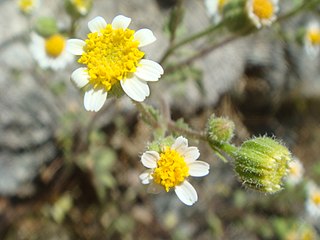
Perityleae is a tribe of flowering plants in the subfamily Asteroideae. The species of its genera are native exclusively to the New World.

Psacalium is a genus of flowering plants in the sunflower family. Indianbush is a common name for Psacalium.
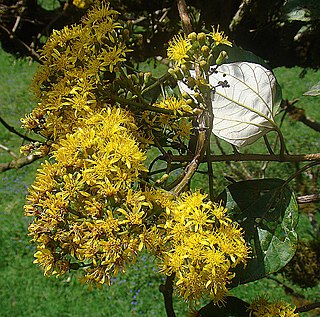
Sinclairia is a genus of Latin American plants in the tribe Liabeae within the family Asteraceae.
Pseudobahia is a genus of California plants in the tribe Madieae within the family Asteraceae. These plants are known generally as sunbursts.

Helenieae is a tribe of the plant family Asteraceae. The type genus is Helenium, but the best known members of the tribe are the Gaillardia. Helenieae are usually placed in their own tribe, but some authors include this and several other tribes as subtribes within a broader definition of the tribe Heliantheae.
Psathyrotopsis is a genus of North American plants in the tribe Bahieae within the family Asteraceae.

Chaenactideae is a tribe of flowering plants in the subfamily Asteroideae of the family Asteraceae.
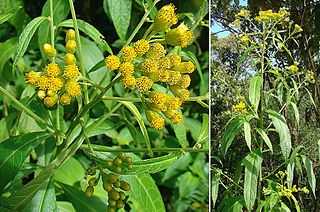
Neurolaeneae is a tribe of flowering plants in the subfamily Asteroideae of the family Asteraceae.


















